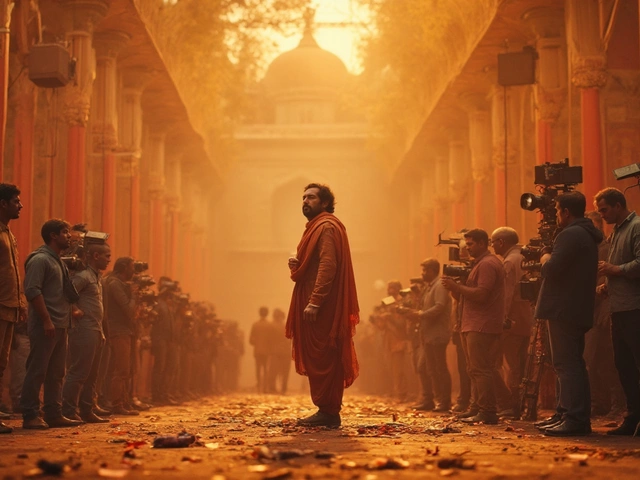
Ever tried golfing in Antarctica? Yeah, about as impossible as watching Netflix in certain parts of the world. For most of us, Netflix is as accessible as air, ready to binge anytime we like. But believe it or not, a handful of countries still don't enjoy that luxury. Curious? Let's take a peek at these places where streaming's sweetheart is a no-go.
The reasons Netflix skips these spots are as varied as Arjun's rollercoaster obsession with Pokémon cards. It's not just about missing out on your favorite series, but also about politics, economics, and sometimes, the pure drama of it all. Whether it's government decisions or tech hurdles, these barriers keep Netflix out of a few countries.
- Where Netflix is Missing
- Why These Countries?
- Impact on Locals
- Legal Workarounds
- How Netflix Decides Availability
- Future Possibilities
Where Netflix is Missing
So, where exactly is Netflix a no-show? There are a few specific places where the streaming giant isn’t rolling out the red carpet just yet: China, North Korea, Syria, Crimea, and Russia. Each region has its own unique mix of reasons for the absence, from political disagreements to logistical challenges.
First up, China. Here, Netflix never really stood a chance due to strict government regulations on foreign content. The country has its own booming streaming scene, and foreign platforms need to navigate a maze of red tape to enter the market, so Netflix has focused on working around this issue—investing in content production instead.
When it comes to North Korea, we're not exactly shocked. Its government is super strict about outside media, including streaming availability. So, until things change politically, locals will likely stay tuned only to state-approved programming.
Then there’s Syria and Crimea. These regions face international sanctions that impact various businesses, including digital services like Netflix. It's not just about economic constraints; the sanctions restrict all sorts of international dealings, which puts a damper on streaming services setting up shop there.
Lastly, Russia, where things recently took a turn. Due to evolving political issues and regulations, Netflix stopped its operations, pulling out of the market entirely. It's a recent development and quite the shake-up for viewers who were happily binging away just yesterday.
Curious about how this affects daily life in these countries? Imagine wanting to kick back with your favorite shows and realizing your options just shrunk significantly. But don’t lose hope yet! With a little creativity, people often find ways to watch their beloved series, even if Netflix isn’t officially available in their backyard.
Why These Countries?
Alright, so why on earth are these countries giving the cold shoulder to Netflix? Each of them has its own story, and it’s not always as straightforward as a simple yes or no. Let's dive into what's actually happening.
First up is North Korea. Now, we all know it’s not exactly an open book. The government controls almost everything, including what its citizens can watch. Any type of foreign media is strictly regulated, and that's a massive roadblock for Netflix. It's about control and maintaining a tight grip over information coming into the country.
Then there's China. Although Netflix is a colossal player globally, it's been unable to crack into the Chinese market. The Chinese government has strict online censorship laws and usually prefers local streaming services, making it tough for international platforms to get a foot in the door. Plus, partnering with a local company could be a complex and costly affair for Netflix.
Syria is another country where Netflix isn’t available, largely due to U.S. government embargoes. These sanctions limit not just Netflix but many other American services from operating there. It's a tangled web of politics and international relations that's got simple streamers stuck in the middle.
Throw Crimea and parts of Russia into the mix. Due to geopolitical tensions and sanctions, Netflix is unavailable in these regions. Sanctions often lead companies like Netflix to cut ties, leaving locals to find alternatives.
In some countries, it’s not just about politics. Sometimes, it’s purely a matter of economics or tech readiness. Setting up the infrastructure can cost a pretty penny, and if it doesn’t promise enough return on investment, well, companies might just reconsider.
These hurdles are more than just black and white decisions. They're deeply rooted in issues of control, market dynamics, and international politics. That said, where there's a will—and the right circumstances—Netflix may eventually find a way.
Impact on Locals
Imagine you're in a country where Netflix isn’t part of daily life. Sounds like being stuck in a time warp, right? But for folks in places like North Korea or Syria, that's the reality. Without access to this streaming giant, locals miss out on what's trending globally, whether it’s the latest must-watch series or those intriguing documentaries everyone’s buzzing about.
So what do they do instead? Well, many turn to local TV shows and movies, which are often limited in diversity and production value. These countries are often heavily monitored by their governments, and the content allowed is, let's just say, somewhat controlled. This can result in a limited understanding of different cultures and global issues because they see the world through a narrower lens.
On the upside, local filmmakers might get more spotlight since people can't simply switch to international streaming alternatives. This has led to a somewhat unique cinema landscape in these places, although it's still a constant battle against censorship and tight budgets. Some residents, tech-savvy ones, often find illegal ways to access Netflix and other platforms, but this comes with risks—like fines or even jail time.
Then, there's the economic angle. The absence of Netflix means lost opportunities for job creation in tech and media industries. Imagine how many scriptwriters, translators, and technical workers are missing out on gigs that could improve their livelihoods.
No streaming availability also affects education through entertainment. Shows like ‘Our Planet’ and ‘The Social Dilemma’ are more than just screen candy; they're legit learning tools. Missing these can mean missing on the latest insights into our world and future.
Interestingly, this digital divide is getting narrower as other streaming services and tech innovations slowly creep in, but for now, the absence of Netflix still has a notable pinch on culture and knowledge.

Legal Workarounds
So, you're in a country without Netflix, and you're itching to catch up on the latest binge-worthy series. Don’t worry; there are some legal ways to go about it, though it might require a bit of effort and creativity.
First, virtual private networks (VPNs) come to mind. VPNs can help reroute your internet traffic through servers in different countries, making it look like you're browsing from a Netflix-supported place. While this sounds slick, Netflix's terms of service frown upon using VPNs for this purpose and have been cracking down on them. Plus, connectivity can get choppy if you’re using a Malaysian server trying to access Netflix US.
- Smart DNS services: Unlike traditional VPNs, these focus on rerouting just the DNS, with the potential for faster streaming since it only changes the server location for specific services. It's less secure than a VPN but often smoother for video streaming.
- Find partner streaming services: In some regions, Netflix content can be accessed legally through local streaming partners. Services often purchase rights to Netflix originals, offering them to their local subscribers.
- Physical media: Old-school but effective, buying or renting DVDs or Blu-rays of Netflix shows or films can be a viable option if available. It won't be the most immediate access, but it's legal and reliable.
Using tools or services that circumvent geo-blocking might give you access, but it’s crucial to respect local laws and Netflix's terms. Some users swear by these methods; just keep updated on what's allowed in your region.
How Netflix Decides Availability
Wondering how the wizards behind Netflix decide where it pops up? It’s a mix of tech, rules, and cold hard cash. At its core, Netflix's decision on availability boils down to a few key factors, like government regulations, infrastructure, and market potential.
First off, it’s all about the local rules. If the country's government has strict censorship laws or restrictions on streaming services, Netflix might just steer clear. These regulatory hurdles can be a tough labyrinth to navigate, even for a giant corporation.
Infrastructure is another make-or-break factor. So, if a country's Internet speeds are like trying to stream through a molasses pipe, that's a huge deterrent. High-speed internet is essential for the best user experience, and without it, Netflix might not see it as a viable market.
Now, let’s talk business. Netflix evaluates the potential subscriber base in a market—how many people might actually pay for the service. They do a bit of number crunching, survey data, and market research to decide if entering a country will keep their investors smiling.
Netflix’s decision also considers the competition—if the market is already flooded with strong local streaming services, Netflix might take that as a hint to invest its energies elsewhere instead.
Last but not least, don't forget content licensing. Getting rights to stream shows can be a complex, costly dance, and some regions just don't make it easy or affordable. All these pieces come together in the decision of where you can (or can't) binge-watch to your heart's content.
Future Possibilities
So, what are the odds Netflix will make its way to the few countries still off the grid? The chances are not as slim as you might think. As the world's internet infrastructure grows and global relationships shift, doors for these digital giants are slowly cracking open.
Political and economic changes could be game-changers. When countries like China or North Korea reconsider strict regulations or improve bilateral relationships, something as simple as a signature could bring Netflix to millions more viewers overnight. Of course, this is easier said than done, considering the complicated regulatory hoops requiring jumping through. Until then, Netflix keeps its playlist ready, perhaps throwing in a few more subtitles!
New technological advances play a role too. With next-gen satellites and swanky delivery systems, streaming could eventually overcome tech barriers. For instance, some underdeveloped areas gaining better internet could make launching platforms like Netflix much more feasible. As internet accessibility expands, so will demand for platforms rich in content.
It's not just about waiting. Netflix itself continually looks for creative ways to enter restricted spaces. Testing out regional content, partnering with local telecom giants, or creating content specifically catering to local tastes can be pathways to breaking grounds in new territories.
The world is changing, and entertainment platforms like Netflix are at the forefront of these evolutions. As laws, technologies, and appetites for binge-worthy shows evolve—who knows maybe one day Netflix will be as universally available as a good old cup of chai!





Write a comment